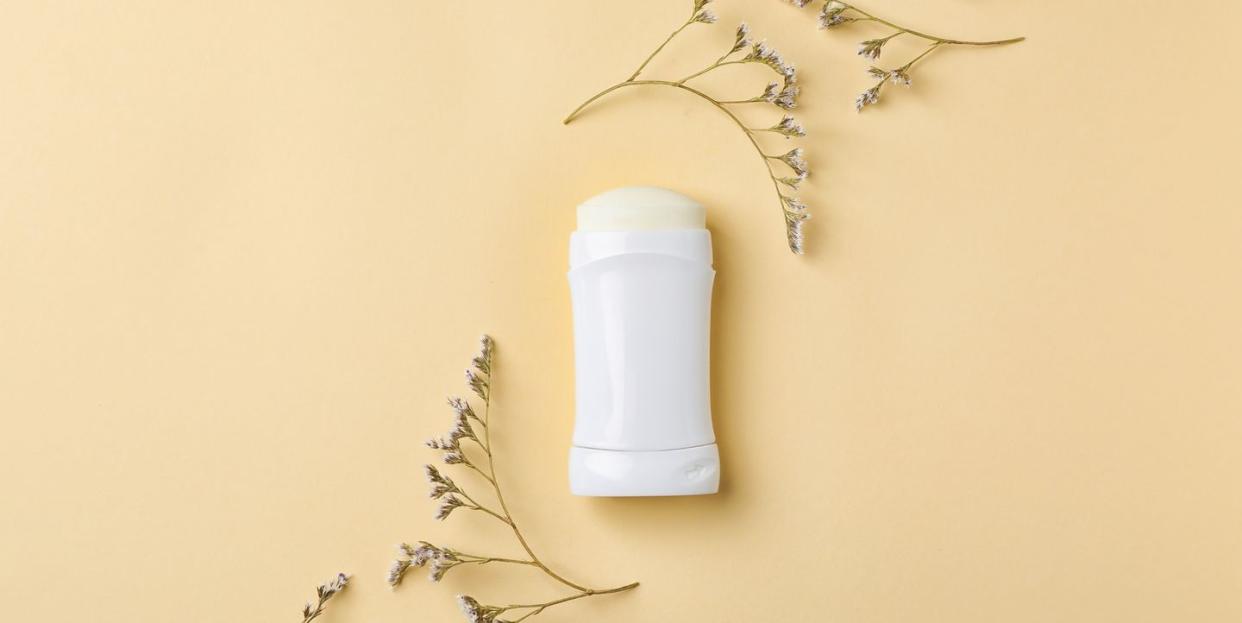Do You Really Need to Detox From Your Deodorant?

I’d like to kick things off by saying I’m pro natural. Natural remedies? Big fan. Natural talent? Thumbs up from me! Natural selection? What’s not to love—it’s probably what saved us from being menaced by dragonflies the size of cats. (Just google “Meganeura.”)
But when it comes to natural deodorants, I’ve always been a skeptic. I sweat. Not enough to require a doctor’s help (and my heart goes out to those who do), but definitely enough to get some awkward looks from people who go in for a hug after I’ve been walking outdoors for any period of time longer than a Kim Petras song. For that reason, I’m ideally suited to an antiperspirant: The active ingredient—typically an aluminum salt—forms a plug that pretty much blocks your sweat gland, cosmetic Perry Romanowski tells me.

But the whole idea of these products, fueled by fears that aluminum may be linked to certain forms of cancer and Alzheimer’s disease, makes some people uncomfortable. Because of that, the market for “natural” alternatives is thriving. For the record: No conclusive link between antiperspirant use and the development of breast cancer or Alzheimer’s disease exists, and the active ingredients are regulated by the FDA as over-the-counter drugs and generally considered safe for use.
Natural deodorants claim to do what all deodorants do: absorb perspiration, mask odor, or a combination of both. Proponents profess that when you switch from a conventional formula to a natural one, you may be forced to suffer through a “detox” period, during which time you smell worse until your body “adjusts” by purging all of the chemicals built up from your years of antiperspirant use. And that brings us to the question at hand: Is a deodorant detox a real thing—and if so, necessary? I went to the experts to break it down:
First, your skin isn’t a “detox” organ.
True detoxification is carried out by your liver—and, if you’re like me, you subjected it to some wild times in college. Your skin has one purpose and one purpose alone: To keep things out. “We have to be careful when we’re using the word ‘detox’—the majority of what’s coming out of your skin when you sweat is salt,” says Heidi Waldorf, M.D., president of Waldorf Dermatology Aesthetics in Nanuet, NY. “The aluminum in antiperspirant is inert; it ultimately dissolves, and you’re done with it.”
Bottom line: You don’t sweat out toxins. “Sweating is just the normal way your body deals with increased temperature,” says Alok Vij, M.D., a Cleveland Clinic dermatologist who specializes in the treatment of hyperhidrosis, or excessive sweating. See, when your internal temperature exceeds the normal range of about 98- to 100-degrees Fahrenheit, your brain senses that you’re getting too hot and sends signals to your nervous system to release sweat, the evaporation of which cools you back down. “It’s thermoregulation, period,” Waldorf adds.
Second, there’s no research to support the “detox” phenomenon.
Let’s pause for a quick bio lesson: There are millions of microscopic bacteria that live naturally on the skin under our arms, and these little guys, in a sense, feed off of our perspiration. As these bacteria, specifically a kind called corynebacterium, break down all that sweat, it releases a scent: What we think of as body odor.
Detox advocates point to a 2016 study that found that when people stopped using antiperspirants, they had more bacteria in their armpit area, as proof of the theory. But that’s really just common sense. When you sweat more—and when you stop using antiperspirant, that’s likely to happen—there’s more food for those little microbes, so they proliferate. Interestingly, the study also found that people who stopped using deodorants and those who didn’t use anything at all actually had higher levels of corynebacterium. So these people, in theory, should actually smell worse than the former antiperspirant users.
So what does all this tell us about the deodorant detox theory? Not much. “This article shows that people who held off on using a product for about a week experienced a change in their skin bacteria—it’s not altogether surprising,” Vij says. The study didn’t track the makeup of bacteria on people’s underarms for a long period of time, so we really have no way to knowing if these microbe populations leveled off, as the detox theory would suggest. “The problem is, we’re beginning to get all of this information about the skin microbiome without knowing its clinical relevance,” Waldorf adds. “There’s no evidence in this article to show that the microbes that were reduced or increased are beneficial or not.”
Bottom line: Use a product that works for you.
If you don’t like the way a deodorant—natural or otherwise—is performing, there’s no science-based reason to continue using it, and there’s no evidence to show that the body odor you’re trying to mask will suddenly, miraculously disappear. If you feel more comfortable using a natural product, and find one you like, that’s cool with me. But if your body odor and sweating is persistent and bothersome, an antiperspirant is likely your best bet. If nothing seems to be helping, check with your dermatologist.
Curious about experimenting with natural deodorants? Check out our round-up of derm-approved products. But as always, scan the ingredient label before swiping. If it’s aluminum you’re looking to avoid, Romanowski tells me some brands that market themselves as “natural” use alum in their formulations and that’s—you guessed it!—an aluminum salt.
Stay un-stinky, friends!
For more stories like this, sign up for our newsletter.

